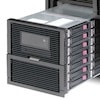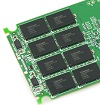HP’s new IBRIX X9730 Storage solution is intended to serve organizations with NAS storage requirements that have grown too complex or too large to manage with current-generation NAS filers. The IBRIX X9730 scales to 1.68PB of capacity in a single system and 16PB in a single namespace to support long-term, high-volume information archival as well









 Amazon
Amazon